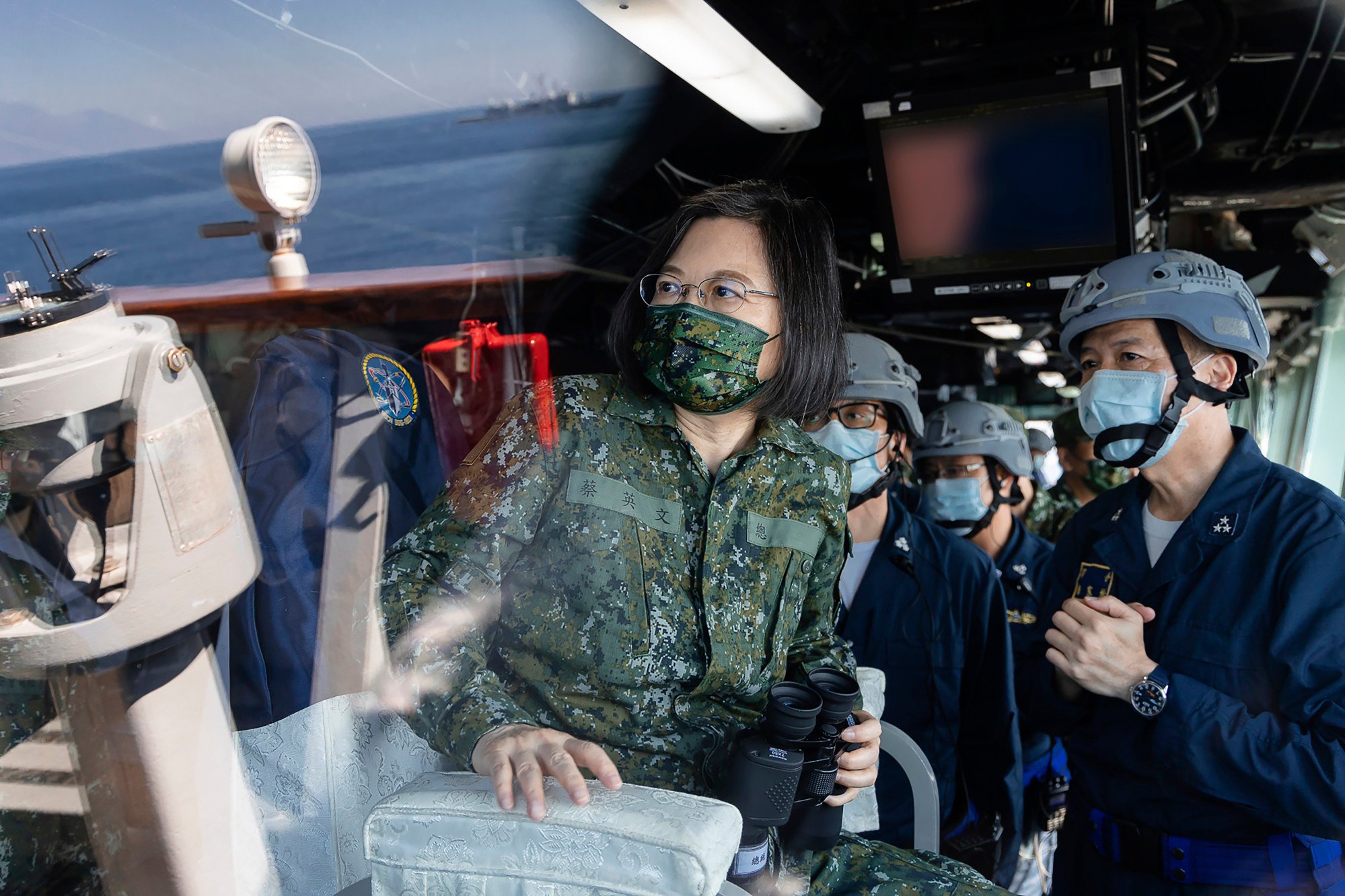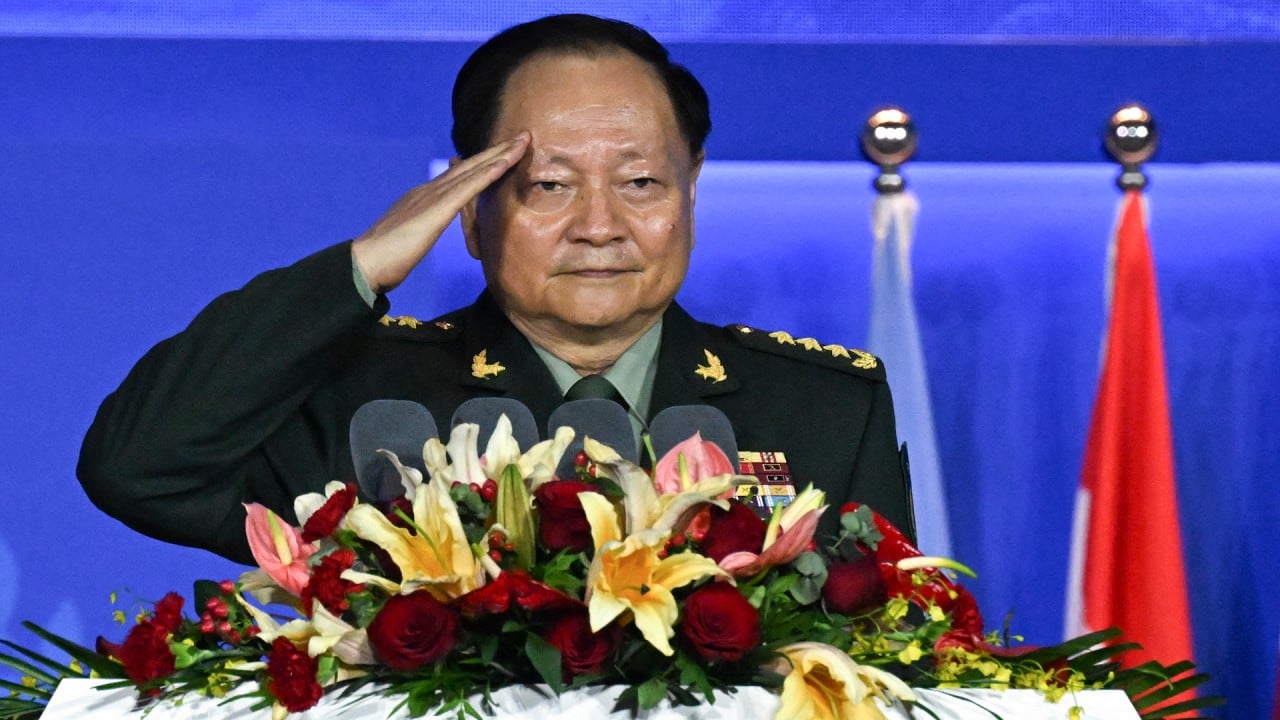Beijing sees Taiwan as part of China, to be reunited by force if necessary. The United States, like most countries, does not recognise self-governed Taiwan as independent, but is opposed to any attempt to take the island by force.
Washington is also legally bound under its 1979 Taiwan Relations Act to help the island protect itself, by providing “arms of a defensive character”, and is its top international supporter and weapons supplier.
The act, passed three months after Washington switched diplomatic recognition to Beijing in January 1979, aimed to demonstrate that the US was not abandoning its old ally. But it is deliberately ambiguous about Washington’s commitment to directly defend the island against an attack from Beijing – seen as aimed at discouraging supporters of Taiwan independence.
Fallout from Taiwan elections may ‘heighten risk of US-China missteps’
Fallout from Taiwan elections may ‘heighten risk of US-China missteps’
According to the Pentagon, the tactical systems sale would include follow-on life cycle support to maintain Taiwan’s C4 capabilities – involving command, control, communications and computers.
Dean Chen, a professor of political science at Ramapo College of New Jersey, compared the latest deal to those announced under Biden’s predecessor, Donald Trump.
“The nature of the arms sale this time – to merely do a follow-on life-cycle support of Taiwan’s C4 capabilities – is relatively less provocative than, say, the Trump 2019 sales,” Chen said.
Trump’s approval in 2019 for an US$8 billion arms sale to Taiwan involving 66 F-16 fighter jets was one of the largest single such transactions. It also came five months ahead of presidential elections in Taiwan in January 2020, when Tsai Ing-wen of the independence-leaning Democratic Progressive Party was re-elected for a second and final term.
Li Nan, a visiting senior research fellow at the National University of Singapore’s East Asian Institute, also said the software upgrade was a “low-key and less eye-catching” move than selling fighter jets, ammunition and warships, but was still likely to incur Beijing’s wrath.
A similar warning was sounded by Xin Qiang, deputy director of the Centre for American Studies at Fudan University. “The latest arms sale … will inject negative energy into bilateral relations despite the fact that [both sides] have wanted to bring about a thaw or momentum of detente to the relationship after the Xi-Biden summit,” Xin said.
US arms sales to Taiwan have also long been a sore point, but did not take the centre stage in its relations with Beijing in the decades when mainland China remained focused on economic development.
It was only in the late 2000s that things began to change, as Beijing’s military modernisation drive started to take off.
The quick shift in military balance in favour of Beijing raised concerns over Taiwan’s ability to defend against a cross-strait attack. US arms sales to Taiwan began to be ramped up, to not only boost the island’s defence capacity but also counter the rise of Beijing as Washington’s geopolitical rival.
After stagnating in the early 2010s, arms sales have speeded up since the Trump presidency.
According to Taipei, the C4 equipment deal is the 12th weapons sale to the island in the three years since the Biden administration took over.
During Trump’s four years in office, the US approved 11 arms sales to Taiwan. In comparison, there were three arms deals reached during Barack Obama’s two terms.
“[The latest arms sale] is compatible with the Biden administration’s intent to compete intensely with the PRC while avoiding derailing their fragile relationship that was so painstakingly mended last month in San Francisco,” Chen said, using the acronym for mainland China’s official name – the People’s Republic of China.
As with previous US arms transfers, Beijing has steadfastly condemned the spate of weapons sales under Biden. Increasing US-Taiwan security cooperation has also left Beijing nervous, seeing it as a signal that the US is opposed to China’s peaceful rise.
The US has supported Taiwan’s military aims under Tsai to develop a “porcupine strategy” – involving asymmetric warfare and “smaller, cutting-edge technologies, and more agile military strategic concepts and weapon platforms” to exploit the vulnerabilities of a stronger adversary, Chen said.
“This would be different from past US administrations’ arms sales packages which laid more emphasis on large-ticket items like fighter jets and tanks.”
Li at NUS said the C4 upgrade would strengthen Taiwan’s asymmetric warfare capacity involving highly dispersed and decentralised events.
It would enable the different armed services to share a common battlefield picture in real time, to ensure a “seamless sort of coordination” and achieve interoperability among land, air and navy forces, he said.

Zhang Zhizhou, a professor at the School of International Relations and Diplomacy at Beijing Foreign Studies University, said Beijing was likely to view the sale as part of Washington’s strategy to obstruct reunification efforts, and be spurred to step up its efforts towards achieving that goal.
“Beijing will view it as Washington’s [move] … to intentionally suppress China, making its peaceful reunification with Taiwan more difficult,” Zhang said.
“The US’ arming of Taiwan not only limits the mainland’s options in its peaceful policy towards Taiwan, but also reinforces the urgency for Beijing to achieve reunification by force.”
Both Xin and Zhang said the timing of the move, just a month after the breakthrough San Francisco summit, would also undermine strategic trust as the two sides try to rebuild ties following months of heightened tensions over issues including Taiwan, Beijing’s territorial claims in the South China Sea, and US-led tech curbs on Beijing.
“From Beijing’s point of view, the US is playing the Taiwan card by stepping up military security cooperation,” Xin said. “It will deal a blow to the fragile strategic mutual trust between the US and China, deepening China’s worries that the US is hindering China’s reunification plan.”
Robert Sutter, a professor of practice of international affairs at George Washington University, said while the US-China divide over the arms sales issue had existed since 1979, it had now become “irreversible”.
Such sales “will continue after Taiwan’s elections [this month],” Sutter forecast.
“The US government today is strongly committed to supporting Taiwan and to using such sales and other efforts to deter China from using coercive means against Taiwan and thereby changing the status quo in the Taiwan Strait.”
More than 19 million Taiwanese are expected to vote in presidential and legislative elections on January 13, with the outcome expected to shape both cross-strait and US-China relations.
Vice-President and DPP candidate William Lai Ching-te is the favourite in the race, with almost all opinion polls placing him ahead of the mainland-friendly Kuomintang’s Hou Yu-ih and Ko Wen-je of the smaller Taiwan People’s Party.
Beijing has urged Taiwanese voters to “stand on the right side of history … and advance the process of the peaceful reunification of the motherland”.
This came two days after Xi in his New Year’s Eve address said “reunification” with Taiwan was inevitable, a point he also highlighted to Biden when they met in November.
Continued US arms sales could also undermine Beijing’s charm offensive approach towards eventual reunification, said Raymond Kuo, director of the Taiwan Policy Initiative and a senior political scientist at US-based think tank Rand Corporation.
“International support simply makes it harder [for Beijing] to entice or coerce the people [in Taiwan] back into the mainland,” Kuo said. “Providing the Taiwanese with an independent defensive capability means that China must rely more on attraction. Beijing has struggled with that approach.”
Taiwan’s increased engagement with Washington under Tsai has seen Beijing step up military and economic pressure on the island. The People’s Liberation Army has frequently staged exercises around the island in recent years, including major live-fire drills after then-US House speaker Nancy Pelosi visited in August 2022 and Tsai met Pelosi’s successor Kevin McCarthy in the US in April. PLA warplanes now also regularly cross the Taiwan Strait median line, once an unofficial barrier between the two sides.
Mainland China airs documentary signalling preparation for Taiwan attack
Mainland China airs documentary signalling preparation for Taiwan attack
The US says its aim in selling arms to Taiwan is to credibly deter Beijing from taking military action against the island, and also seeks to assure Beijing that the arms sales do not contradict Washington’s 1979 “one-China policy” – which recognises the PRC government as the sole, legitimate government of China.
However, the current cross-strait situation had made the US double down on such sales, Chen said.
“The US message is essentially that these arms sales must go forward in response to China’s escalated and more sophisticated military threats towards Taiwan.”




